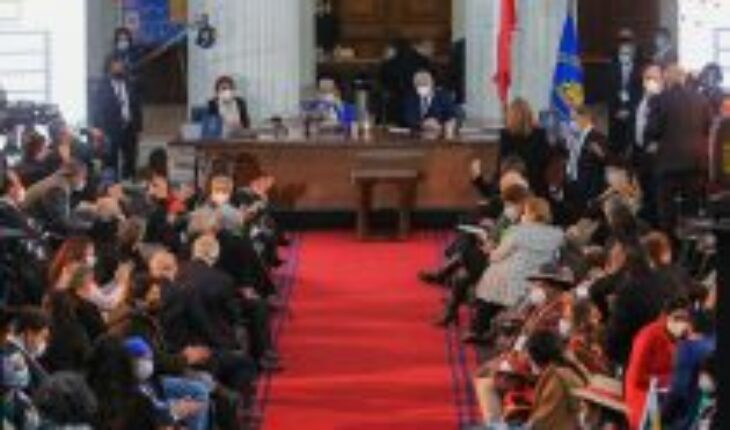The Social outbreak was a great rebellion against the usual order: anti-neoliberal, anti-patriarchal, anti-clerical, anti-professorial, anti-police. A break with the prevailing authority. The streaks against “adultocracy” abounded. To use as an argument a learning from the past could even outrage. He nullified the voice of statesmen, academics and technocrats. Around its flames, many who had never tasted it enjoyed the power, and, therefore, with good reason, did not want it to end. There are few things as appetizing as being in charge. Those who have always been able to exercise it, with more understandable than just reasons, are horrified at the risk of losing it. In any of its versions – economic, political, sociocultural – the word “elite” outraged its protagonists. The explosion was the enemy of the exemplary. He staged contempt for hierarchies. He abhorred the parties, the Congress and not to mention Piñera. No leadership was able to satisfy him and that is why he had no organizations or leaders to represent him. If anyone had raised his head, the democratizing fury would have beheaded him. Not a few suffered funas, even before trying. The president-elect, without going any further.
The Constituent Process broke through, in the midst of the revolt, as a way to rebuild social peace. With no cupular pact being able to extinguish it, the political world, like Pilate, resigned itself to a “agree and decide yourselves.” Then, to the chagrin of the insatiable, he installed a minimum standard of operation, tried to get involved in the game with very bad results – only 51 of the 155 elected militate – and, since then, within the former National Congress, the presence of the parties is hardly felt. They support their members with constitutional lawyers and other technicians, mainly through their study centers, but without visible intervention of their structures. The only ones who operate as such are the communists. It is noticeable that they have experience leading social movements, because while the rest of the parties entrenched themselves in their groups of belonging, they applied a strategy of effective action offering these groups their strategic complicity.
The Convention, daughter of the Social Outbreak, does not recognize leadership. At most, coordinators who try to align dispersed wills, gathered around causes that practically no sector despises – social rights, environmentalism, feminism, regionalism, indigenism – but who group within those who subscribe to them with greater intensity. The idea that someone can come up with a Constitution ready under their arm to impose on others is a bizarre fantasy. It is enough to walk one day through the former Congress to realize that such an attempt would be ridiculous, pathetic, suicidal. Whoever believed that because he studied a subject he would be listened to more attentively than the rest, has had to endure frustration. Teacher tones are mocked and not recognized. The conviction abounds that no knowledge matters more than another. At least on the left, the feeling of procrastination brings together and summons more than any ideology. The peripheral voice exerts an incontestable influence on the central voice.
This makes the work of the Convention as interesting as it is complex. The possibility of a driving axis composed of the FA, the Socialist Collective and INN, so far, has not worked. To imagine that the government of Gabriel Boric, from La Moneda, will manage to structure it, is an excessive pretension. The last election of president and vice president moved largely against the figure of the official politician. It was the argument put forward by “the peoples” and “movements” in opposition to Beatriz Sánchez. Any instruction coming from La Moneda, if known, would arouse an adverse reaction, if not furious. On the other hand, the fate of the next government is inextricably linked to that of the Convention.
Boric has sought – his cabinet demonstrates this – to reconcile the desire for change, renewal and stability. Leave the corner and expand your network of complicities to constitute a majority that allows you to carry out the transformations you have proposed. Get out of the discourse to focus on construction. A new “measure of the possible”.
The challenge of the new Constitution is much longer in nature, but it requires even more willingness to meet. Can devote himself with greater ambition to drawing desiress that a government, which is measured by the achievements, but has the obligation to get them an even broader support, capable of imposing itself on all the governments to come, whatever their ideological sign and the concrete strategies it proposes to carry them out.
How will we reconcile the particularities, the different causes and promises, in a coherent and harmonious text, which functions as a whole? Fernando Atria is right when he says that it will not be a model Constitution like the one that the experts of a university cloister would have made. It will not possess the delicacy and elegance of a poetic creation, nor the rigor of geniuses. With that many of us feel it our own, we should give ourselves for paid. Those of us who are there are not better than most, but very similar to her. It will be the task of others to fix it along the way. That is why it is so important that its political system works well, what Roberto Gargarella calls its “engine room”. If we do not manage to make a gear capable of virtuously moving the democratic forces in these times of uncertainty and liquidity (what a harassing word), it will fail in its attempt to keep citizens’ wishes updated. Understanding the latter – that we do not come to close the story, but to open a new chapter – is something that not everyone is yet clear about. How will we manage to steer the Convention in this direction, given its conditions described above? That is the challenge that awaits us.
A Convention Without Leadership – The Counter
January 23, 2022 |





